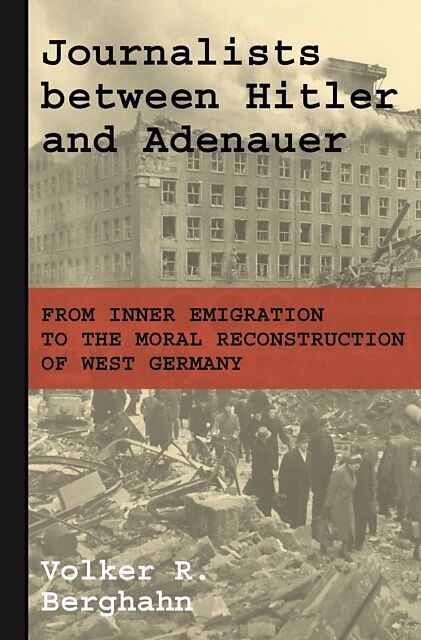Journalists between Hitler and Adenauer - From Inner Emigration to the Moral Reconstruction of West Germany
Einband:
Fester Einband
EAN:
9780691179636
Untertitel:
From Inner Emigration to the Moral Reconstruction of West Germany
Genre:
Politikwissenschaft
Autor:
Volker Berghahn
Herausgeber:
Princeton University Press
Anzahl Seiten:
288
Erscheinungsdatum:
21.12.2018
ISBN:
978-0-691-17963-6
Relying on previously unknown sources, this fine book charts the path of three leading journalists before, during, and after the Third Reich. Berghahn reassesses the concept of 'inner emigration' and examines the 'gray zones' between conformity and resistance that each protagonist tried to exploit. He thereby casts new light on the role of journalists in providing moral and political guidance to German statesmen and the public as they confronted the crimes of Nazism.James Retallack, University of Toronto
Autorentext
Volker R. Berghahn is the Seth Low Emeritus Professor of History at Columbia University. His books include American Big Business in Britain and Germany and Europe in the Era of Two World Wars (both Princeton).
Klappentext
Journalists between Hitler and Adenauer takes an in-depth look at German journalism from the late Weimar period through the postwar decades. Illuminating the roles played by journalists in the media metropolis of Hamburg, Volker Berghahn focuses on the lives and work of three remarkable individuals: Marion Countess Dönhoff, distinguished editor of Die Zeit; Paul Sethe, "the grand old man of West German journalism"; and Hans Zehrer, editor in chief of Die Welt. All born before 1914, Dönhoff, Sethe, and Zehrer witnessed the Weimar Republic's end and opposed Hitler. When the latter seized power in 1933, they were, like their fellow Germans, confronted with the difficult choice of entering exile, becoming part of the active resistance, or joining the Nazi Party. Instead, they followed a fourth path--"inner emigration"--psychologically distancing themselves from the regime, their writing falling into a gray zone between grudging collaboration and active resistance. During the war, Dönhoff and Sethe had links to the 1944 conspiracy to kill Hitler, while Zehrer remained out of sight on a North Sea island. In the decades after 1945, all three became major figures in the West German media. Berghahn considers how these journalists and those who chose inner emigration interpreted Germany's horrific past and how they helped to morally and politically shape the reconstruction of the country. With fresh archival materials, Journalists between Hitler and Adenauer sheds essential light on the influential position of the German media in the mid-twentieth century and raises questions about modern journalism that remain topical today.
Zusammenfassung
The moral and political role of German journalists before, during, and after the Nazi dictatorship
Journalists between Hitler and Adenauer takes an in-depth look at German journalism from the late Weimar period through the postwar decades. Illuminating the roles played by journalists in the media metropolis of Hamburg, Volker Berghahn focuses on the lives and work of three remarkable individuals: Marion Countess Dönhoff, distinguished editor of Die Zeit; Paul Sethe, the grand old man of West German journalism; and Hans Zehrer, editor in chief of Die Welt.
All born before 1914, Dönhoff, Sethe, and Zehrer witnessed the Weimar Republic's end and opposed Hitler. When the latter seized power in 1933, they were, like their fellow Germans, confronted with the difficult choice of entering exile, becoming part of the active resistance, or joining the Nazi Party. Instead, they followed a fourth pathinner emigrationpsychologically distancing themselves from the regime, their writing falling into a gray zone between grudging collaboration and active resistance. During the war, Dönhoff and Sethe had links to the 1944 conspiracy to kill Hitler, while Zehrer remained out of sight on a North Sea island. In the decades after 1945, all three became major figures in the West German media. Berghahn considers how these journalists and those who chose inner emigration interpreted Germany's horrific past and how they helped to morally and politically shape the reconstruction of the country.
With fresh archival materials, Journalists between Hitler and Adenauer sheds essential light on the influential position of the German media in the mid-twentieth century and raises questions about modern journalism that remain topical today.

Leider konnten wir für diesen Artikel keine Preise ermitteln ...
billigbuch.ch sucht jetzt für Sie die besten Angebote ...
Die aktuellen Verkaufspreise von 6 Onlineshops werden in Realtime abgefragt.
Sie können das gewünschte Produkt anschliessend direkt beim Anbieter Ihrer Wahl bestellen.
Loading...
Die aktuellen Verkaufspreise von 6 Onlineshops werden in Realtime abgefragt.
Sie können das gewünschte Produkt anschliessend direkt beim Anbieter Ihrer Wahl bestellen.
| # | Onlineshop | Preis CHF | Versand CHF | Total CHF | ||
|---|---|---|---|---|---|---|
| 1 | Seller | 0.00 | 0.00 | 0.00 |
